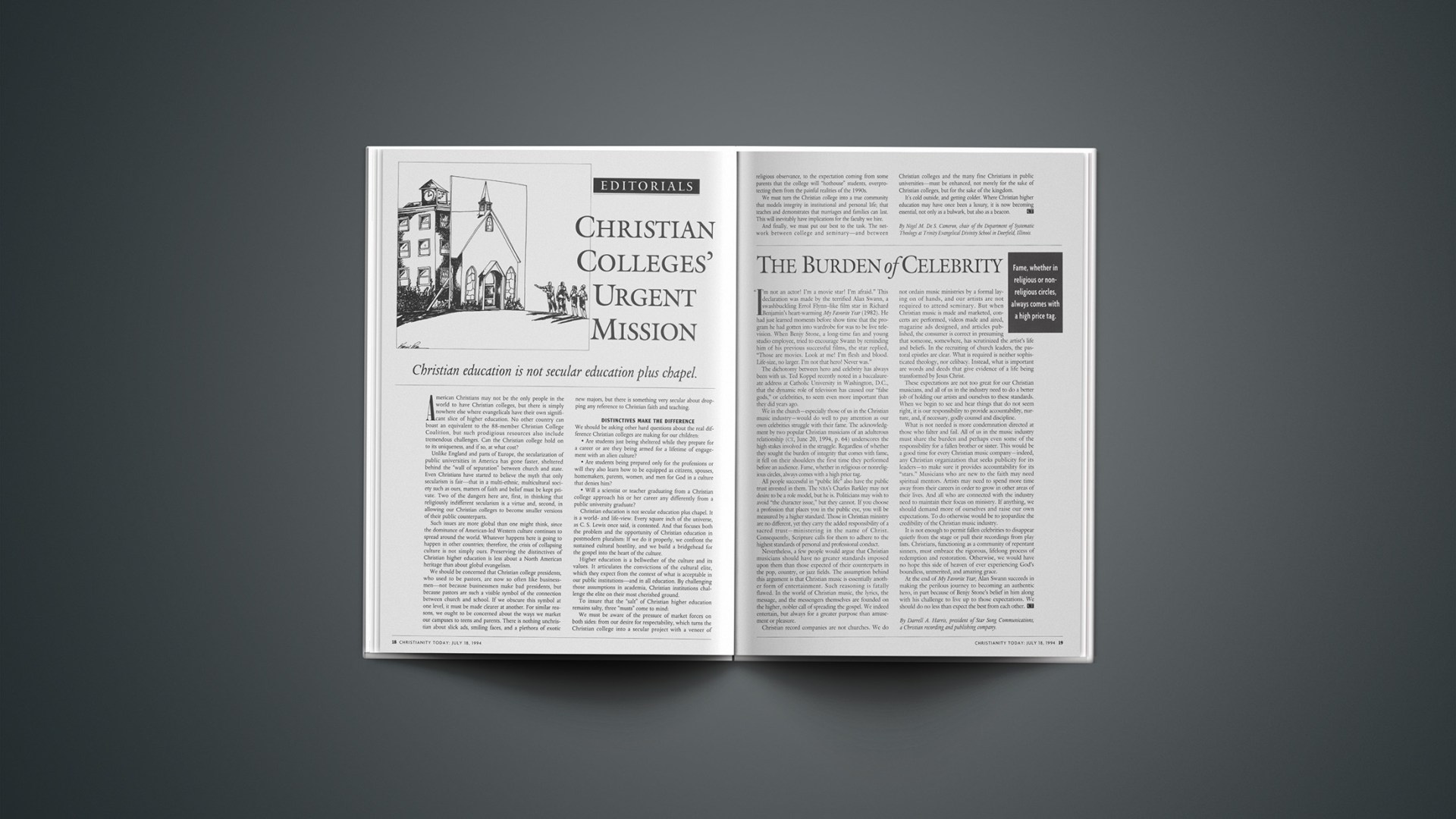“I’m not an actor! I’m a movie star! I’m afraid.” This declaration was made by the terrified Alan Swann, a swashbuckling Errol Flynn-like film star in Richard Benjamin’s heart-warming “My Favorite Year” (1982). He had just learned moments before show time that the program he had gotten into wardrobe for was to be live television. When Benjy Stone, a long-time fan and young studio employee, tried to encourage Swann by reminding him of his previous successful films, the star replied, “Those are movies. Look at me! I’m flesh and blood. Life-size, no larger. I’m not that hero! Never was.”
The dichotomy between hero and celebrity has always been with us. Ted Koppel recently noted in a baccalaureate address at Catholic University in Washington, D.C., that the dynamic role of television has caused our “false gods,” or celebrities, to seem even more important than they did years ago.
We in the church—especially those of us in the Christian music industry—would do well to pay attention as our own celebrities struggle with their fame. The acknowledgment by two popular Christian musicians of an adulterous relationship (CT, June 20, 1994, p. 64) underscores the high stakes involved in the struggle. Regardless of whether they sought the burden of integrity that comes with fame, it fell on their shoulders the first time they performed before an audience. Fame, whether in religious or nonreligious circles, always comes with a high price tag.
All people successful in “public life” also have the public trust invested in them. The NBA’s Charles Barkley may not desire to be a role model, but he is. Politicians may wish to avoid “the character issue,” but they cannot. If you choose a profession that places you in the public eye, you will be measured by a higher standard. Those in Christian ministry are no different, yet they carry the added responsibility of a sacred trust—ministering in the name of Christ. Consequently, Scripture calls for them to adhere to the highest standards of personal and professional conduct.
Nevertheless, a few people would argue that Christian musicians should have no greater standards imposed upon them than those expected of their counterparts in the pop, country, or jazz fields. The assumption behind this argument is that Christian music is essentially another form of entertainment. Such reasoning is fatally flawed. In the world of Christian music, the lyrics, the message, and the messengers themselves are founded on the higher, nobler call of spreading the gospel. We indeed entertain, but always for a greater purpose than amusement or pleasure.
Christian record companies are not churches. We do not ordain music ministries by a formal laying on of hands, and our artists are not required to attend seminary. But when Christian music is made and marketed, concerts are performed, videos made and aired, magazine ads designed, and articles published, the consumer is correct in presuming that someone, somewhere, has scrutinized the artist’s life and beliefs. In the recruiting of church leaders, the pastoral epistles are clear. What is required is neither sophisticated theology, nor celibacy. Instead, what is important are words and deeds that give evidence of a life being transformed by Jesus Christ.
These expectations are not too great for our Christian musicians, and all of us in the industry need to do a better job of holding our artists and ourselves to these standards. When we begin to see and hear things that do not seem right, it is our responsibility to provide accountability, nurture, and, if necessary godly counsel and discipline.
What is not needed is more condemnation directed at those who falter and fail. All of us in the music industry must share the burden and perhaps even some of the responsibility for a fallen brother or sister. This would be a good time for every Christian music company—indeed, any Christian organization that seeks publicity for its leaders—to make sure it provides accountability for its “stars.” Musicians who are new to the faith may need spiritual mentors. Artists may need to spend more time away from their careers in order to grow in other areas of their lives. And all who are connected with the industry need to maintain their focus on ministry. If anything, we should demand more of ourselves and raise our own expectations. To do otherwise would be to jeopardize the credibility of the Christian music industry.
It is not enough to permit fallen celebrities to disappear quietly from the stage or pull their recordings from play lists. Christians, functioning as a community of repentant sinners, must embrace the rigorous, lifelong process of redemption and restoration. Otherwise, we would have no hope this side of heaven of ever experiencing God’s boundless, unmerited, and amazing grace.
At the end of “My Favorite Year,” Alan Swann succeeds in making the perilous journey to becoming an authentic hero, in part because of Benjy Stone’s belief in him along with his challenge to live up to those expectations. We should do no less than expect the best from each other.
Copyright © 1994 Christianity Today. Click for reprint information.
ctjul94mrw4T80185619










